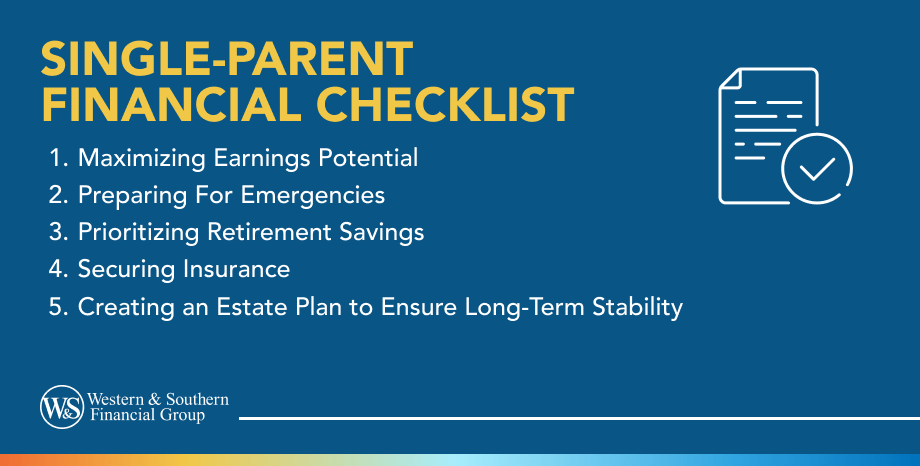

Key Takeaways
- Explore freelance work or side hustles that match your skills to cover expenses and build savings.
- Start an emergency fund with automatic contributions to handle unexpected costs like medical bills or car repairs.
- Open an IRA to prioritize retirement savings and grow investments through compounding interest.
- Consider disability, critical illness, and life insurance to financially protect your child in case of unforeseen events.
- Develop an estate plan to detail guardianship and asset distribution, ensuring stability for your child if you pass away.
Twenty percent of children under age 18 live in a single-parent household in the U.S.1 Given the rising number of children being raised by single parents, it's more important than ever to discuss single-parent finances.
The reality: A single parent's budget may feel tighter than that of a couple or married household. Also, if a single parent is divorced from their child's other parent, important financial decisions involving the child could become even more nuanced. Fortunately, a financial checklist for single moms and dads could help you develop a solid foundation for tomorrow.
Put Your Earnings Potential to Work
While some economic opportunities have made it easier for single parents to live off their income, you may still face many challenges. Single parents can take longer to recover from financial emergencies. The costs of child care, education and extracurricular activities can also make budgets extremely tight. However, knowing your earnings potential - and learning how to bring in additional income - could help you cover your expenses.
Start by identifying your passions and what career track or venture you ultimately want to pursue. A little self-reflection could help you determine potential alternative income streams. Imagine you're a proficient writer or talented designer. You may be able to find freelance work online, through your connections - or through the connections of your friends and family members. This extra income could help you cover the expenses of raising a child with a single-parent budget.
Budget for the Unexpected
Children are unpredictable - this is one of the most predictable facts of life. So, it's wise to expect the unexpected as a parent. From broken bones to braces, unexpected expenses can tighten budgets - and may also cause single parents to dip into their savings to make ends meet. Even the sudden need for ongoing monthly costs, such as therapy or child care, can seriously affect single-parent finances.
Consider creating an emergency fund, which could help create a financial buffer between you and these unexpected costs. Fortunately, most banks make it easy to create automatic savings plans that put money aside every month. There are also several smartphone apps you could use to save small sums of money over stretches of time - as even small amounts of money can come in handy when padding your emergency savings.
Consider Your Plans for Retirement
Between regular living expenses and the cost of raising a child, a single-parent budget often feels stretched to the max, and it can feel challenging to save for the future. However, making retirement a financial priority could help you build a strong financial foundation for tomorrow. After all, there will come a time when you'll want to retire and having a plan in place could help you move forward with confidence.
There are ways to prepare for retirement while still meeting your current day-to-day needs. This might involve opening an individual retirement account (IRA), where you can make even small contributions. Even if you can't max out your contributions due to budget constraints, compounding interest and the reinvesting of dividends over time could go a long way toward increasing your retirement savings. Of course, it's important to remember that there are no guarantees and tax considerations when it comes to investing.
Think About the Tough Topics
There may also come a time when you can no longer work due to an accident or illness. Having a plan in place for handling worst-case scenarios could help give you additional peace of mind.
From disability income insurance and critical illness insurance to long-term care insurance, there are products available that could help you face these difficulties. As a single parent, it may also be helpful to consider life insurance, which could help provide financial protection for your child and other loved ones if you were to pass away unexpectedly.
Examine Your Estate Plan
An estate plan is an important consideration for everyone, as it could help make things easier for your loved ones in the event of your untimely death - and it can be especially important for single parents. An estate plan could allow you to determine who would raise your child if you were to pass away unexpectedly. Without a formal plan in place for tomorrow, you may run the risk of the legal system deciding guardianship.
An estate plan can also allow you to determine how the payouts from insurance policies would be handled after you die. Since your child may only be relying on your income, it's important to make sure they're taken care of financially should you unexpectedly pass away. It's also important to note that some divorce decrees may require the other parent become the beneficiary of your life insurance policy. This can, however, be changed in certain cases. Your attorney would be able to direct you in this regard.
Single-parent finances can present some unique challenges to planning for tomorrow - but meeting your financial goals isn't impossible. By learning to balance current finances with long-term planning, single parents could work to create a stable financial foundation for tomorrow.
Learn about savings plans designed to support your child's education and well-being. Get My Free Financial Review
Frequently Asked Questions
How to survive financially as a single parent?
What is a good income for a single mom?
What is a sinking fund savings?
How much should a single parent have in savings?
Sources
- National Single Parent Day: March 21, 2024. https://www.census.gov/newsroom/stories/single-parent-day.html.























